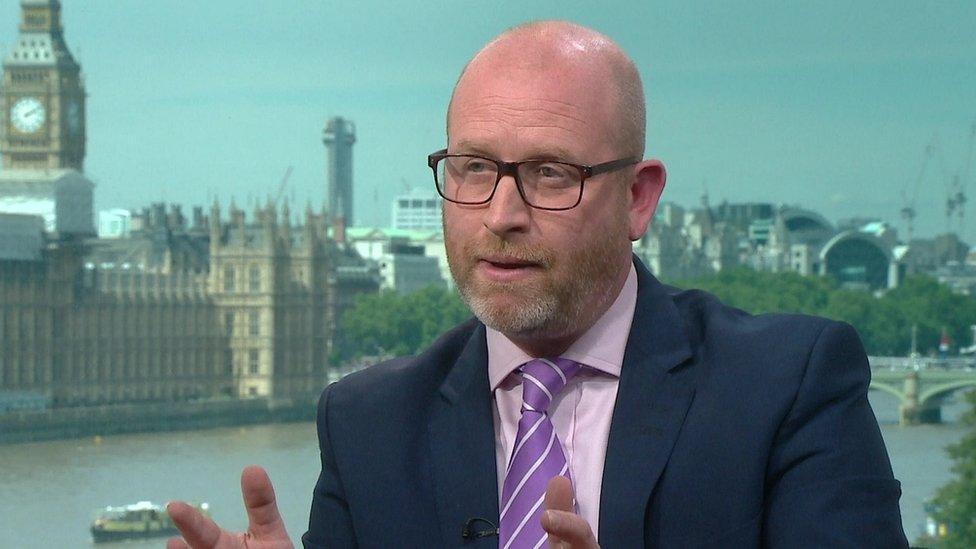UKIP's Paul Nuttall suggests internment for terror suspects
- Published

UKIP leader Paul Nuttall has suggested the detention without trial of suspected terrorists.
Mr Nuttall said he was not calling for an immediate return to internment, but "wouldn't take anything off the table".
Speaking to the BBC's Andrew Neil, he backed the return of the death penalty but said this was not UKIP policy.
In the interview, to be broadcast at 19:30 BST on BBC One, he insisted there remained plenty for his party to fight for after achieving its Brexit goal.
UKIP won the third highest number of votes in the 2015 general election - 3.8 million - but this gave it just one MP, who subsequently quit the party.
Mr Nuttall is under pressure after a poor showing in the local elections earlier this month in which UKIP gained a single seat and lost all 145 it was defending.
It has recently set out a number of policies it says will help tackle extremism and improve integration.
"We are the only ones that are coming up with an agenda to improve integration in this country," Mr Nuttall said, pointing to UKIP's call to ban face coverings and reduce net migration to zero.
'Lives on the line'
He also suggested the use of internment, would mean the government had the power to detain suspected terrorists indefinitely without trial.
Critics say the tactic led to an increase in violence when it was introduced in Northern Ireland in 1971, and it was seen to have acted as a recruiting sergeant for the IRA.
"I think we've got to look at ways of ensuring that our people are safe, whether that is a return to control orders, whether that is tagging these people, who knows in the future maybe a return to internment," the UKIP leader said.
Given the "vast" costs of monitoring a reported 23,000 extremists, he said: "I'm not saying now is the time to return to this, but I wouldn't rule it out."
Mr Nuttall also backed waterboarding for terrorist suspects if there was "going to be an immediate attack and people's lives were on the line" and would support the return of the death penalty in some circumstances.
The UKIP leader was also asked about his remark in a Mail on Sunday interview, external that he would be prepared to act as executioner if the death penalty was reintroduced.
"They asked me that question," he said.
"If I'm prepared to stand up say that I believe in the death penalty, then you know, maybe I would pull the lever on people like [serial killer] Ian Brady in the past."
'Wriggle room'
On Brexit, Mr Nuttall said all EU nationals who were living in the UK before Article 50 was invoked in March should be allowed to stay, but the status of subsequent arrivals would depend on the agreement reached with the EU.
He said the UK should not pay the EU "a penny" as it leaves, and defended UKIP's "one in one out" migration policy.
This would be over a five-year period so there would be "a lot of wriggle room", he said.
"No-one's talking about putting up the drawbridge," he said, but warned of "simply unsustainable" population numbers by middle of the next century.
He claimed his party had set the agenda on grammar schools and immigration policy as well as Brexit and predicted it would become bigger than ever if Theresa May "backslides" on the UK's EU departure.